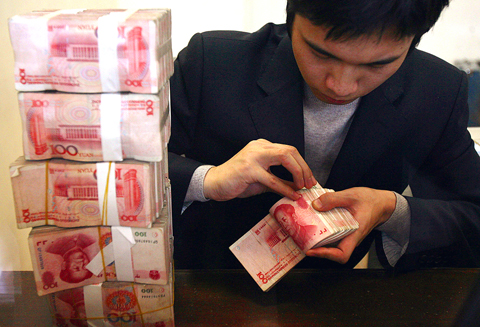China said it plans to increase the amount of money circulating in its economy next year in a new effort to spur consumer spending and shield the country from a global downturn.
Saturday’s announcement by the State Council, or Cabinet, comes on the heels of a multibillion-dollar economic stimulus package announced last month that calls for injecting more government money into the economy through spending on construction and other projects.
There are mounting signs that China’s economic slowdown is sharper and deeper than expected. Exports fell last month for the first time in seven years and Chinese Industry Minister Li Yizhong (李毅中) warned on Friday that worse was to come.

PHOTO: AFP
China will increase its money supply by 17 percent next year, the Cabinet said in a statement on its Web site. It said that would be 3 percentage points to 4 percentage points above the total growth of economic output and consumer prices.
Increasing the supply of money is aimed at stimulating domestic economic activity and spending by making more credit available to encourage consumers and companies to borrow.
“We must strengthen the role of the financial sector in supporting economic growth by better implementing an active fiscal policy and moderately easing monetary policy,” the Cabinet statement said.
The growth rate of China’s money supply slipped this year as business activity and bank lending slowed.
The growth in China’s broadest measure of money supply shrank from 16 percent in August to 15 percent last month, the central bank said. That measure, known as M2, includes cash and bank deposits.
The Cabinet also decided to increase by 100 billion yuan (US$14.6 billion) the amount of loans for the country’s policy banks this year and suspend and reduce the sale of some central bank securities, the statement said.
The central bank has been draining billions of dollars from the economy every month to reduce pressure for prices to rise as revenues from China’s booming export industries flood through the economy.
The government said it would stop sales of three-year central bank notes and reduce sales of one-year and three-month bank notes, but gave no other details.
With economic growth forecast at 9 percent and inflation at about 6 percent this year, China’s money supply growth has just kept pace with growth in commercial activity. With both growth and inflation forecast to be lower next year, the planned expansion in money supply should be much larger than is needed to maintain commercial activity.
Li said on Friday that the government will spend 15 billion yuan (US$2.2 billion) to subsidize loans to companies to improve technology and cut energy use. Li said Beijing might buy surplus steel to help producers as demand plummets, as well as cut taxes to spur auto and real estate sales.

TRAGEDY STRIKES TAIPEI: The suspect died after falling off a building after he threw smoke grenades into Taipei Main Station and went on a killing spree in Zhongshan A 27-year-old suspect allegedly threw smoke grenades in Taipei Main Station and then proceeded to Zhongshan MRT Station in a random killing spree that resulted in the death of the suspect and two other civilians, and seven injured, including one in critical condition, as of press time last night. The suspect, identified as a man surnamed Chang Wen (張文), allegedly began the attack at Taipei Main Station, the Taipei Fire Department said, adding that it received a report at 5:24pm that smoke grenades had been thrown in the station. One man in his 50s was rushed to hospital after a cardiac arrest

SAFETY FIRST: Double the number of police were deployed at the Taipei Marathon, while other cities released plans to bolster public event safety Authorities across Taiwan have stepped up security measures ahead of Christmas and New Year events, following a knife and smoke bomb attack in Taipei on Friday that left four people dead and 11 injured. In a bid to prevent potential copycat incidents, police deployments have been expanded for large gatherings, transport hubs, and other crowded public spaces, according to official statements from police and city authorities. Taipei Mayor Chiang Wan-an (蔣萬安) said the city has “comprehensively raised security readiness” in crowded areas, increased police deployments with armed officers, and intensified patrols during weekends and nighttime hours. For large-scale events, security checkpoints and explosives

A car bomb killed a senior Russian general in southern Moscow yesterday morning, the latest high-profile army figure to be blown up in a blast that came just hours after Russian and Ukrainian delegates held separate talks in Miami on a plan to end the war. Kyiv has not commented on the incident, but Russian investigators said they were probing whether the blast was “linked” to “Ukrainian special forces.” The attack was similar to other assassinations of generals and pro-war figures that have either been claimed, or are widely believed to have been orchestrated, by Ukraine. Russian Lieutenant General Fanil Sarvarov, 56, head

PUBLIC SAFETY: The premier said that security would be tightened in transport hubs, while President Lai commended the public for their bravery The government is to deploy more police, including rapid response units, in crowded public areas to ensure a swift response to any threats, President William Lai (賴清德) said yesterday after a knife attack killed three people and injured 11 in Taipei the previous day. Lai made the remarks following a briefing by the National Police Agency on the progress of the investigation, saying that the attack underscored the importance of cooperation in public security between the central and local governments. The attack unfolded in the early evening on Friday around Taipei Main Station’s M7 exit and later near the Taipei MRT’s Zhongshan